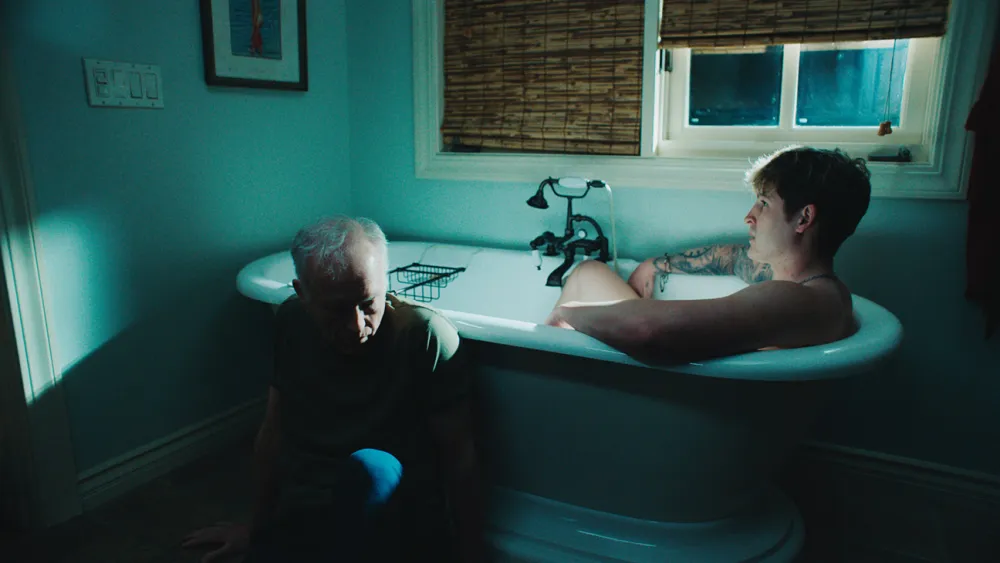Blue Film Review – Reed Birney Delivers a Chilling Performance in a Disturbing, Thought-Provoking Drama
Mark Duplass presents a bold, challenging debut from writer-director Elliot Tuttle, Blue Film, which dives into the morally unsettling terrain of pedophilia.
Mark Duplass presents a bold, challenging debut from writer-director Elliot Tuttle, Blue Film, which dives into the morally unsettling terrain of pedophilia. At its center are Reed Birney as Hank, a middle-aged man grappling with his past, and Kieron Moore as Aaron, one of his former students who has grown into adulthood. The film does not shy away from its difficult subject matter, offering an intimate, intense, and often uncomfortable examination of manipulation, memory, and power.

The Bottom Line:
Daring, unsettling, and emotionally charged — not for the faint of heart.
Cast: Reed Birney, Kieron Moore
Director/Writer: Elliot Tuttle
Runtime: 90 minutes
A Story of Uneasy Reunion
The narrative opens in a hotel room where Aaron and Hank are sharing a bed. On the surface, the scene might resemble a consensual sexual encounter, but the disturbing reality is clear: Hank had been Aaron’s English teacher years ago in Maine, and the sexual and emotional imbalance in their history cannot be ignored. Hank’s obsession with Aaron began when the boy was just twelve, and he was eventually fired and incarcerated for inappropriate conduct toward another student.
Now, years later, Aaron has reinvented himself. Leaving Maine at seventeen, he changed his name, relocated to Los Angeles, and transformed into a confident, assertive adult working as a cam performer. The reunion at the hotel is charged with tension as Aaron navigates his conflicting feelings about the man who once preyed on him.
Power, Performance, and Provocation
The film’s tension is built largely through dialogue and subtle psychological power plays. Initially, Aaron interacts with Hank while the older man wears a ski mask and records their encounter, creating a surreal, almost ritualistic dynamic. Only when Hank reveals himself does the emotional confrontation fully begin.
Birney delivers a performance that is both chilling and complex, portraying Hank as a man who believes his attraction is a form of love and who frames his past behavior as moral testing. Moore is equally compelling, balancing vulnerability, defiance, and carefully controlled submission. Their interplay exposes layers of manipulation, memory, and self-deception, forcing the audience to grapple with a morally fraught and deeply uncomfortable relationship.
A particularly unsettling sequence has Aaron role-playing as his younger self under Hank’s direction, including being shaved from head to toe. Moore conveys the disturbing regression convincingly, showing how Aaron both loses and retains control. This dynamic allows the film to probe the psychology of power and the persistence of trauma.
Formal Choices and Emotional Impact
Tuttle structures the film with a chamber-play intimacy, keeping the focus almost entirely on Aaron and Hank. Editor Zach Clark heightens the unease by cutting between the hotel scenes and footage of children at play, underscoring the broader implications of Hank’s obsession. These juxtapositions make the viewer constantly aware of the tension between innocence and corruption, amplifying the moral weight of the story.
Visually and tonally, the film feels restrained but precise, emphasizing dialogue, body language, and subtle gestures over sensationalism. There is no easy comfort for the audience — the movie demands engagement, reflection, and a willingness to sit with profound discomfort.
Context and Influences
Blue Film recalls some of the psychological and ethical explorations of Gregg Araki’s Mysterious Skin, while also reflecting the dark, realistic emotional tension seen in Michael Cuesta’s L.I.E.. Yet Tuttle’s voice is distinct: he combines chamber-piece intimacy with cinematic experimentation, creating a work that burrows under the skin and lingers long after the credits roll.
Blue Film is not an easy watch, nor is it meant to be. It confronts audiences with unsettling realities, demanding both patience and reflection. Birney and Moore elevate the material, delivering performances that are unnerving, precise, and emotionally resonant. Tuttle’s debut establishes him as a fearless, intelligent filmmaker unafraid to explore the most difficult human behaviors.
In the end, Blue Film is a provocative, deeply disturbing study of obsession, trauma, and power — a film that lingers in the mind, forcing viewers to wrestle with questions of morality, consent, and memory long after the final frame.
